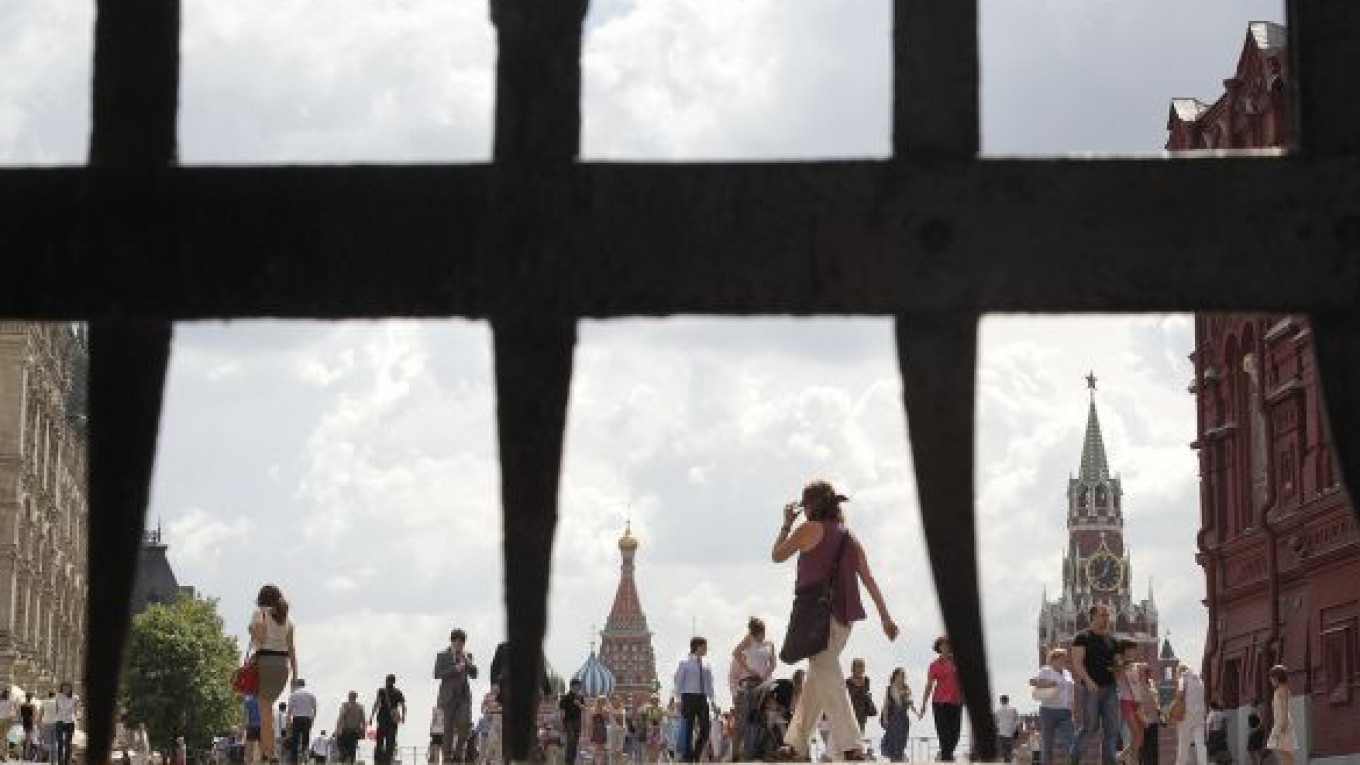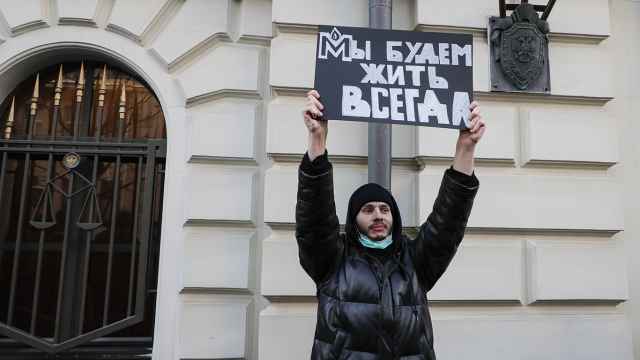Editor's note: This is the first article in a series on punitive psychiatry.
In the Soviet Union, dissidents were labeled schizophrenics, thrown into psychiatric hospitals and drugged just for questioning the government. It wasn't until the Soviet demise that officials grasped the difference between criticism and mental illness.
But old habits die hard.
Galina Yartseva, 47, editor of a small opposition newspaper in Veliky Novgorod, learned this the hard way after she took on the city establishment, accusing local officials of corruption and a local plant of air pollution damaging to children's health.
She was slammed with dubious charges of showing disrespect to a judge in 2010, but cleared by a jury. A few weeks later, the Supreme Court overturned the acquittal at the request of regional prosecutors and sent the case back to the regional court.
In the new trial, regional prosecutors asked the court to order a psychiatric examination of Yartseva. Local psychiatrists found that she showed "signs of a personality disorder" but was "criminally sane," meaning she could be tried in court, her lawyer Yegor Mylnikov said.
In mid-June, a jury acquitted Yartseva of the charges again.
"It was clear beforehand that the examination was ordered to discredit me," Yartseva said by telephone on June 24 from Veliky Novgorod, located 550 kilometers northwest of Moscow.
"This is not just an offense but an obstruction of my journalistic activities, because who will listen to me if I am declared insane?" she said.
Yartseva was distraught but appeared otherwise normal during a separate interview in April in Moscow, where she came for an independent psychiatric examination intended to clear her name. The Moscow psychiatrist confirmed her mental health to be sound.
Yartseva's ordeal places her in the company of at least a dozen activists across the country whose sanity has been questioned over the past decade after they crossed local authorities.
The people are a ragtag bunch, ranging from liberal activists and neo-Nazis to poets and college professors. All those located by The Moscow Times were eventually declared sane and released, but they insist that their plight was persecution for political or anti-corruption activism. If true, this would imply a dangerous precedent for a country still mired in its Soviet legacy.
Regional authorities use psychiatric examinations as part of intimidation campaigns against people who "file lots of complaints in courts and other state bodies trying to instate justice," said Tatyana Malchikova, president of the Civil Commission for Human Rights in Moscow, which has been tracking abuse in psychiatry since 2000.
The centralized Soviet system of prosecution by mental treatment is now dismantled, and authorities "are afraid to use psychiatry for political goals," said Yury Savenko, president of the Independent Psychiatric Association.
But while that may be true for the federal government, officials on the ground are not above declaring critics insane, said lawyer Yury Yershov, who defends victims of psychiatric abuse.
Criminal cases do not require the psychiatric examination of suspects, but a check can be ordered during the trial if any party appeals to the court with doubts about the defendant's sanity, said Mylnikov, Yartseva's lawyer.
There are no set rules on what mandates a check. The decision on whether to order it rests with the judge — many of whom are known to be on amiable terms with local authorities and prosecutors and willing to lend an ear to their pleas regardless of how justified they are.
The Veliky Novgorod regional court said in its order for Yartseva to undergo a psychiatric examination that she had showed "unusual emotionality."
Savenko, the psychiatrist, said suspicions are not always unfounded, because some people who pester the authorities with complaints suffer from "querulent and litigious syndrome."
Lawyer Yershov retorted that the syndrome is only a "very convenient" pretext to get rid of people "who sue too much."
Actual mental health treatment is less severe than in Soviet times, when dissidents were kept in psychiatric hospitals for months or even years on forced treatment. Among those who faced the ordeal were human rights champions Vladimir Bukovsky, Valeria Novodvorskaya, Zhores Medvedev and Andrei Almarik. None have had their sanity questioned since 1991, when the Soviet Union collapsed. These days a stay in a psychiatric facility is generally limited to weeks and usually includes no mandatory medication.
Still, even a short time spent in a psychiatric hospital for an examination qualifies as punitive psychiatry simply because it is "always a stress to be among people with grave mental disorders," said Roman Chorny, president of the Civil Commission for Human Rights in St. Petersburg.
The medical community offers little resistance, because state clinics — where court-ordered psychiatric examinations must be held — depend on the very authorities who request checks of their critics, Chorny said. "Psychiatrists often opt to admit a person even when a court order for an examination is flawed for fear that if they refuse too often, the authorities might close their clinics," he said.
Between 2001 and 2010, at least 14 people at odds with the authorities were prosecuted with the help of psychiatrists, according to people interviewed by The Moscow Times and media reports. A 15th person, a university professor, had his sanity questioned amid a business dispute. Malchikova, Chorny and Yershov said additional cases might have gone unnoticed.
Among the group are political activists Roman Nikolaichik, Artyom Basyrov and Larisa Arap, all members of the Other Russia opposition group, and Vadim Charushev, founder of an Internet community for supporters of State Duma Deputy Galina Starovoitova, who was murdered in 1998.
On the other side of the political spectrum are two members of the banned National-Socialist Society: Dmitry Ufimtsev, suspected of killing judge Eduard Chuvashov last year; and Vasilisa Kovalyova, accused of involvement in several ethnic hate killings.
Two reporters who contributed for media outlets run by Chechen separatists — Andrei Novikov, who wrote for the Chechenpress news agency, and Sergei Kryukov, a reporter with Ichkeria.info — also received psychiatric treatment.
Local lawmakers and opposition candidates in elections have also complained of psychiatric abuse. Among them were Rifkhat Khakimov, who ran for office in the Urals town of Pervouralsk; Albert Imendayev, a candidate for the Cheboksary city legislature; and Igor Molyakov, an opposition deputy who served four terms in Cheboksary's regional parliament.
Also on the list are a senior member of the human rights watchdog Memorial in Novosibirsk, Alexei Manannikov, and the poet Yulia Privedyonnaya, who was accused of creating a militant group and abusing minors.
The revival of the practice of requesting psychiatric examinations emerged in the late 1990s, when two successful but low-profile rights activists were confined to psychiatric hospitals, historian Anatoly Prokopenko wrote in a 2005 book on psychiatric abuse.
Yartseva's story is a case study into the problem, although she got off more easily than some. State psychiatrists said after the first check that they lacked data to determine whether Yartseva was sane, and the court ordered an additional examination — by the same doctors — in February. The psychiatrists then questioned Yartseva's acquaintances.
Incidentally, Yartseva had repeatedly criticized local psychiatrists in her articles and accused them in court of cooperating with "swindlers protected by the authorities" who defraud pensioners, the disabled and emancipated orphans of their apartments.
While Yartseva was waging her battle in Novgorod, Left Front activist Vladislav Ryazantsev was sent for a sanity check by the Rostov-on-Don police two days ahead of a March 31 opposition rally that he was to lead.
He was eventually found sane, but only an hour before the rally, one of many held nationwide on the last day of every month with 31 days to draw attention to Article 31 of the Constitution, which guarantees freedom of assembly.
A Rostov-on-Don police spokesman did not immediately return a request for comment about Ryazantsev's detention.
"A senior doctor at the facility told me that unidentified authorities called several hours before I was detained and asked that I be diagnosed as insane," Ryazantsev said by telephone.
To the doctors' credit, they never did.
- Alexei Manannikov, a senior member of rights watchdog Memorial's branch in Novosibirsk who was a political prisoner in Soviet times and a Federation Council senator in the early 1990s, spent a week in a psychiatric ward in December 2010 as part of an investigation into allegations that he defamed a judge.
- Poet Yulia Privedyonnaya was hospitalized in a psychiatric facility in February 2010 for a month as part of a criminal investigation into charges that she formed a militant group under the guise of a poetry club. The check confirmed her sanity, but two club members were sentenced to psychiatric treatment.
- Sergei Kryukov, a reporter with the Chechen separatist web site Ichkeria.info, was hospitalized in a psychiatric facility by a court for a month in June 2009 at the request of the Federal Security Service.
- Rifkhat Khakimov, a candidate in elections in the Urals town of Pervouralsk, was put into a psychiatric hospital for a month for examination in April 2009 as part of a criminal case against him on defamation charges after he accused local law enforcement agencies of corruption.
- Vadim Charushev, founder of an online community for supporters of slain State Duma Deputy Galina Starovoitova, was placed in a psychiatric hospital by police in March 2009 under unclear circumstances and released later that month after treatment.
- Roman Nikolaichik, a lawyer from Garry Kasparov's Other Russia opposition group, was detained in Tver in February 2008, questioned about his political activities, and taken to a local psychiatric hospital afterward. He walked out later that month after forced treatment.
- Andrei Novikov, a reporter for Chechenpress, a news service connected to the Chechen separatist government, was released after nine months in a psychiatric hospital in the Yaroslavl region in 2007.
- Artyom Basyrov, an Other Russia activist, was committed to a psychiatric hospital in Bashkortostan in November 2007 and released a month later after protests by Russian and international human rights groups.
- Larisa Arap, a journalist and Other Russia activist, spent six weeks in a psychiatric facility in Murmansk in 2007. She had criticized the facility in print shortly before her hospitalization.
- Albert Imendayev, an opposition candidate in the 2005 elections for the Cheboksary city legislature, was sent to psychiatric hospital in the middle of his campaign. Officials cited as the reason a series of legal complaints against local officials, police, prosecutors and judges, whom he accused of corruption, cronyism and other wrongdoings. The local prosecutor called his activity "paranoia."
- Igor Molyakov, a card-carrying Communist who served four terms in the Cheboksary region parliament, was sent to a psychiatric facility while serving a six-month jail term for defamation in 2004. A lawyer for the Cheboksary governor said his reports about corruption in the region reflected an outlook so "somber" that it might imply a "mental disorder."
- Ivan Ivannikov, a lecturer at St. Petersburg's State University of Economics and Finance with 38 years of professional experience, was placed in a psychiatric hospital for 60 days in 2003 after repeatedly complaining about a company that botched repairs at his apartment. A psychiatrist ordered the check without examining Ivannikov, ruling that his complaints about the company — which reportedly had ties to city authorities — indicated an "obsession" with "revenge."
- Audit Chamber official Natalya Kuznetsova was fired from her job after accusing her colleagues of stealing $140 million in state funds between 2001 and 2002. When she sued for compensation over her sacking, agency officials accused her of mental problems.
— Natalya Krainova
A Message from The Moscow Times:
Dear readers,
We are facing unprecedented challenges. Russia's Prosecutor General's Office has designated The Moscow Times as an "undesirable" organization, criminalizing our work and putting our staff at risk of prosecution. This follows our earlier unjust labeling as a "foreign agent."
These actions are direct attempts to silence independent journalism in Russia. The authorities claim our work "discredits the decisions of the Russian leadership." We see things differently: we strive to provide accurate, unbiased reporting on Russia.
We, the journalists of The Moscow Times, refuse to be silenced. But to continue our work, we need your help.
Your support, no matter how small, makes a world of difference. If you can, please support us monthly starting from just $2. It's quick to set up, and every contribution makes a significant impact.
By supporting The Moscow Times, you're defending open, independent journalism in the face of repression. Thank you for standing with us.
Remind me later.






